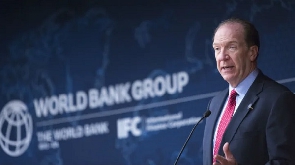Progress against corruption can be made even under the most challenging conditions, a new World Bank report finds.
At a time when unprecedented levels of emergency funds have been mobilized to respond to the COVID-19 pandemic, the report offers a fresh look at some of the most effective approaches and tools to enhance government accountability.
Enhancing Government Effectiveness and Transparency: The Fight Against Corruption focuses on ways to enhance the effectiveness of anti-corruption strategies in the sectors most affected.
It serves as a reference guide to policy makers and anti-corruption champions as further work is needed to sharpen the application of traditional tools.
“The COVID-19 pandemic has resulted in large scale emergency spending by governments at rapid speed to revive the economy as well as protect the poor and vulnerable who suffer disproportionately. As countries embark on the road to a more resilient and inclusive recovery, prudent use of scarce resources in a transparent manner is critical,” said World Bank Managing Director Mari Pangestu, “Progress is possible in all environments and we are committed to work closely with our partners in government, civil society, and the private sector to address corruption and its corrosive impacts.”
Some of the unprecedented emergency spending against COVID-19 has occurred without adhering to the regular checks and balances. While speed is understandable, without proper controls, it exposes governments to a variety of corruption risks that may undermine the effectiveness of their responses.
To foster greater accountability, the report calls on governments to clearly articulate their actions, enforce rules, address violations, and remedy problems as quickly as possible, and in a transparent manner.
The report covers five key thematic areas: public procurement, infrastructure, state-owned enterprises, customs administration, and service delivery, and cross-cutting themes such as open government initiatives and GovTech, with case study examples from around the world.
It will help equip public sector officials and civil society with a modular set of approaches and tools that can be drawn upon and adapted to their specific country context.
The report’s case studies show that measures to curb corruption are often opportunistic, targeting specific areas of vulnerability where and when the political space allows. But even when actions have apparently limited impact, they can provide important foundation for future progress.
In Bangladesh, the implementation of the e-Government Procurement, combined with increased transparency and citizen participation, halved the number of single bidder tenders which improved competition significantly; increased the number of contracts awarded to non-local firms; and led to better prices with successful bidders.
Colombia updated its e-procurement system to publish data in an open way following international standards. As a result, single bid tenders in the public roads agency, INVIAS, went down from 30% to 22%, while cities like Cali saw competitive processes increase from 31% to 56% in about two years.
In Ukraine, making wealth declaration forms of public officials available online was recognized by citizens and the international community as a key tool in the fight against corruption.
The latest data shows that close to 5,3 million documents in the e-declarations system are accessible to the public. As of mid-2020, the High Anti-Corruption Court of Ukraine had 19 cases against officials accused of submitting false information in the Asset and Interest Declaration or intentionally not submitting a declaration.
In Afghanistan, the customs department has been progressively implementing a countrywide computerization of customs clearance operations.
Although significant vulnerabilities exist and revenue loss at the borders remains a substantial challenge, revenue collected by customs has increased seven-fold between 2004 and 2019, and clearance time and the transparency of trade transactions has improved significantly.
The land reform program in Rwanda helped manage the conflicts around land and led to increased efficiency, transparency, citizen participation, and development of viable land governance institutions.
Automation of land records reduced bribes paid to land registry officials as the information was in public domain.
“Institutions are incredibly important for implementing government policies, engaging civil society, and ensuring greater transparency in government operations,” said Ed Olowo-Okere, World Bank Global Director for Governance, “The global report highlights the importance of complimenting the traditional methods of dealing with corruption with advanced ones like GovTech and e-Procurement to address corruption, even in the most challenging and fragile environments.”
Business News of Tuesday, 29 September 2020
Source: worldbank.org

















